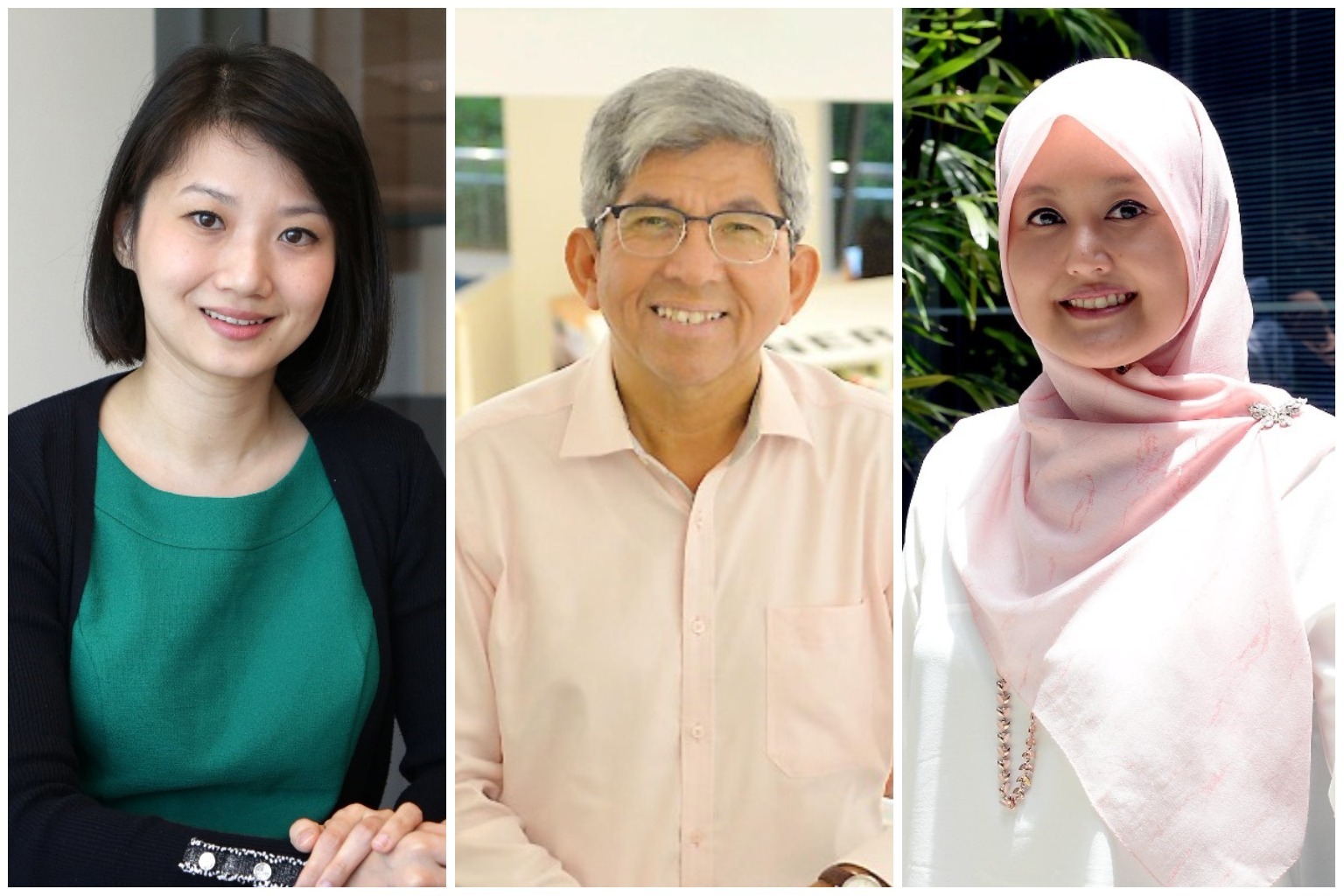Parliament: Ministers, MPs give examples of deliberate falsehoods in Singapore and beyond
Sign up now: Get ST's newsletters delivered to your inbox

(From left) Pasir Ris-Punggol GRC MP Sun Xueling, Minister for Communications and Information Yaacob Ibrahim and Jurong GRC MP Rahayu Mahzam shared their experiences with fake news during the Parliament session on Jan 10, 2017.
PHOTOS: LIANHE ZAOBAO, BERITA HARIAN
Yuen Sin
Follow topic:
SINGAPORE - In 2007, a picture of "halal pork" allegedly being sold in FairPrice outlets went viral on the Internet, causing a stir online and offline.
The supermarket chain had to debunk the falsehood, and also made a police report over it.
But the same picture resurfaced online again in 2011 and 2014, prompting FairPrice to respond publicly that this was an old hoax.
Mr Seah Kian Peng (Marine Parade GRC), who is the chief executive of FairPrice, recounted this in Parliament on Wednesday (Jan 10), as he spoke in support of the motion to appoint a select committee to address the issue of deliberate online falsehoods.
"Even today, 10 years later, I still get messages asking me about this... Indeed, a lie can travel halfway around the world before the truth gets out," said Mr Seah.
He added that FairPrice also had to file a police report last year over untrue claims that its house brand jasmine fragrant rice was made of plastic.
He was among those who recounted examples, both local and foreign, of falsehoods being spread online deliberately.
During the debate on the motion, Minister for Communications and Information Yaacob Ibrahim dug into the past to show that attempts at exerting foreign influence in Singapore are not new.
"This has happened to us even before the advent of the Internet, through newspapers," he said.
In the 1970s, the Eastern Sun newspaper, an English-language daily, was closed after it was found that its proprietor received loans made by Chinese communist agents in Hong Kong. Another paper, the Singapore Herald, was also shut down over "black operations" charges of receiving questionably sourced foreign funds.
Fake information has been used to stoke anti-foreigner sentiments as well, Dr Yaacob added, citing a case involving the now defunct The Real Singapore.
The website claimed in 2015 that a Filipino family had complained to police about participants at the Thaipusam procession that year. The husband and wife team behind the website said it came from a reader's tip-off, which turned out to be a lie.
Other MPs also spoke of their personal encounters with hoaxes.
Nominated MP K. Thanaletchimi and Ms Rahayu Mahzam (Jurong GRC) brought up hoax messages that were recently circulated - the messages claimed that FairPrice was giving out gift cards.
"A friend said she saw a lady insisting (on) a gift card at one of the outlets," said Ms Rahayu of the disamenity it caused.
Ms Sun Xueling (Pasir Ris-Punggol GRC) also spoke of how news of a roof collapse at the Build-To-Order housing project Waterway Terraces in Punggol in November 2016 had mobilised substantial resources, with grassroots leaders, police, Singapore Civil Defence Force officers all rushing down to the scene, while she drove there from another end of town.
It emerged that news about the collapse was false, calling attention to how "false news has caused a wastage of public resources which could have been used in other areas where they are needed more", said Ms Sun.
Nominated MP Ganesh Rajaram said that he was alarmed to receive a WhatsApp message from a retired civil servant last September, which contained a link to a so-called breaking news story alleging that Minister for Foreign Affairs Vivian Balakrishnan had collapsed at a UN summit in New York.
The story had gone viral within minutes, he noted, but a trusted contact in the Ministry of Communications and Information assured him that it was fake.
What astonished him, said Mr Ganesh, was how quickly the piece of news spread and the alarm that it caused. "I can only imagine the distress caused to those who know the minister," he said.
Mr Christopher de Souza (Holland-Bukit Timah GRC) said falsehoods can be a threat to democracy.
During the Brexit referendum in 2016, a misleading poll surfaced, causing people to think that millions of Turkish people would move to Britain if it voted to remain in the European Union, he said.
"What would happen if such important decisions were made based on these false premises?" said Mr de Souza.
In another case, which happened during the British general election in 2017, supporters of a particular party were encouraged to vote via invalid methods or on an invalid day, he added.
"If voters acted on this, the electoral process by which democracy is effected would not function as it was meant to be," Mr de Souza warned.
There were also cases of falsehoods being used to exploit racial and religious fault lines in a society, said MPs and ministers.
In his speech to move the motion on the select committee, Home Affairs and Law Minister K. Shanmugam cited the spread online last June of a bogus message that cat and dog meat was mixed into satay marinade sold in a Geylang bazaar.
Ms Rahayu also brought up an example of a video that went viral during terror attacks in Paris in November 2015.
The video was of a celebration of a cricket match victory in Pakistan, but was being labelled as Muslims in London celebrating the terror attacks.
"The hoax fed into the anger against Muslims in the aftermath of the Paris attacks," Ms Rahayu said. "As a Muslim minority in Singapore, I cringe every time I hear news of terror attacks. I always worry about the distrust that could develop against the Muslims in Singapore.
"It is one of my greatest fears that an online falsehood could trigger anger against the Muslim community here. There could be disastrous implications if this happens in Singapore. The impact to Singapore may be irreversible."

